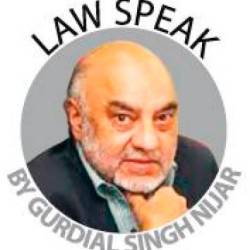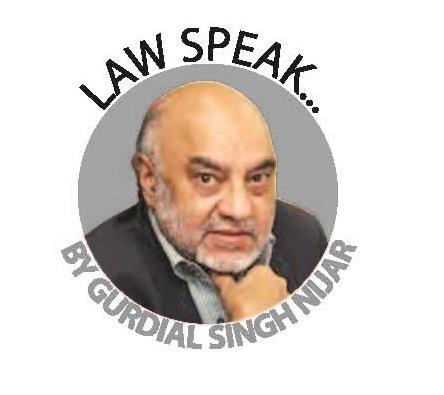THE iniquity of the Sedition Act was brought into sharp focus last week when the Federal Court acquitted the late Karpal Singh of the charge of sedition. Some 10 years ago, at a hastily convened press conference, Karpal commented on the constitutional propriety of the way in which the then Sultan of Perak was seeking to resolve the crisis caused by the crossover of three Pakatan Rakyat (PR) members of the Perak State Assembly to the Barisan Nasional. This ultimately caused the downfall of the PR government.
This doyen of the legal profession, who cut his teeth fighting constitutional law cases, weighed in. And chided the sultan for interviewing the three party-hoppers privately. His highness should allow the state assembly to decide the issue, roared Karpal in his characteristic robust style, citing in support Article 16(6) of the Perak Constitution. Or refer the matter to the Federal Court under its advisory power as countenanced by the Constitution. Else he would be compelled to refer the matter to court, citing the sultan as a potential additional party.
For this Karpal was hauled through various tiers of the courts. And his wife and lawyer-children battled on to establish his innocence after his untimely death in a motor accident in April 2014.
The defence revolved around an opening in the Sedition Act. Permitting to show that a ruler has been misled or mistaken in any of his measures. Nor was he challenging the ruler’s prerogative powers, he repeatedly stressed.
Nonetheless, the Court of Appeal and later the trial court and subsequently another Court of Appeal panel (save for a lone dissenter Justice Tengku Maimun, now Federal Court judge) found him guilty. One court even urged to place the then wheelchair-bound Karpal in jail!
All of these courts and judges, ruled the Federal Court last week, did not give Karpal a fair trial. They had committed the cardinal error of failing to consider his oral testimony given on oath over seven days. This was “a grave miscarriage of justice”.
The burning question then: how come so many judges got it so terribly wrong? Many, if not all of them, highly experienced in the conduct of criminal trials.
This brings us to the nature of the Sedition Act. Crafted in 1948 by a colonial legislature to thwart independence freedom fighters (like Ahmad Boestamam and Gandhi – under an Indian mirror law), the courts look at the words spoken and their context – and little else. The culprit is a provision that there is no need to show intention to commit the crime; nor that the words caused any consequence. So the barren words – sometimes spoken in the cut and thrust of public debate or discontent – and a bit more can land you in jail. Courts too are hemmed in by these drastic provisions.
Now where in this civilised age of enlightened jurisprudence can intent to commit a crime be dispensed with – to prove a heinous crime that is only a pale shade less than treason – a crime punishable with death? A Court of Appeal judgment mandating proof of intention was given short shrift by the then Federal Court panel. How does this square up with the present day liberal climate where transparency and accountability are central to a democratic society – as the Federal Court recently declared: Raub Goldmining v Hue?
Surely the rather obvious solution then is to banish this pernicious law from our law books. A promise in the PH government’s manifesto.
Arguments that this would undermine the status of the rulers and other privileges in the Federal Constitution are grossly unfounded, with respect to these protagonists. As Tan Sri Razali Ismail, chairperson of the Human Rights Commission of Malaysia (Suhakam) reiterated – freedom of expression is not an absolute right and there are existing laws to ensure it is not abused, such as in a situation where it incites violence or promotes hatred.
And abuse there was aplenty. As recounted by Lawyers for Liberty adviser, N Surendran in a letter to Malaysiakini: 170 sedition cases between 2013 and 2016, during the last administration. In 2015 alone, 91 people were arrested, investigated or charged for sedition – five times more than the entire total for the previous 55 years of the law’s existence. A 2015 amendment enhanced the punishments including a minimum prison term.
Nobody was spared: cartoonists, bloggers, opposition politicians, academics, artists, commentators, the media. Its reach was so wide as to blot the right to speak up against the many issues of public concern. Marring the functions of a free and responsible press, as the Centre for Independent Journalism lamented.
In any event, any perceived fears can easily be accommodated under the present laws on criminal law and procedure. By astute amendments if truly necessary. At least then the determination of any offence will come within the established rubric to which judges are routinely accustomed. And any difficulty as experienced by the judges overcome. And injustice obviated.
Incidentally, minutes before the court convened, the ceremonial mace placed in front of the court to symbolise its role, fell to the floor with a resounding thud!
Karpal, you can now “Rest in Peace”!
Gurdial was part of the legal team at the Federal Court hearing. Comments: letters@thesundaily.com














